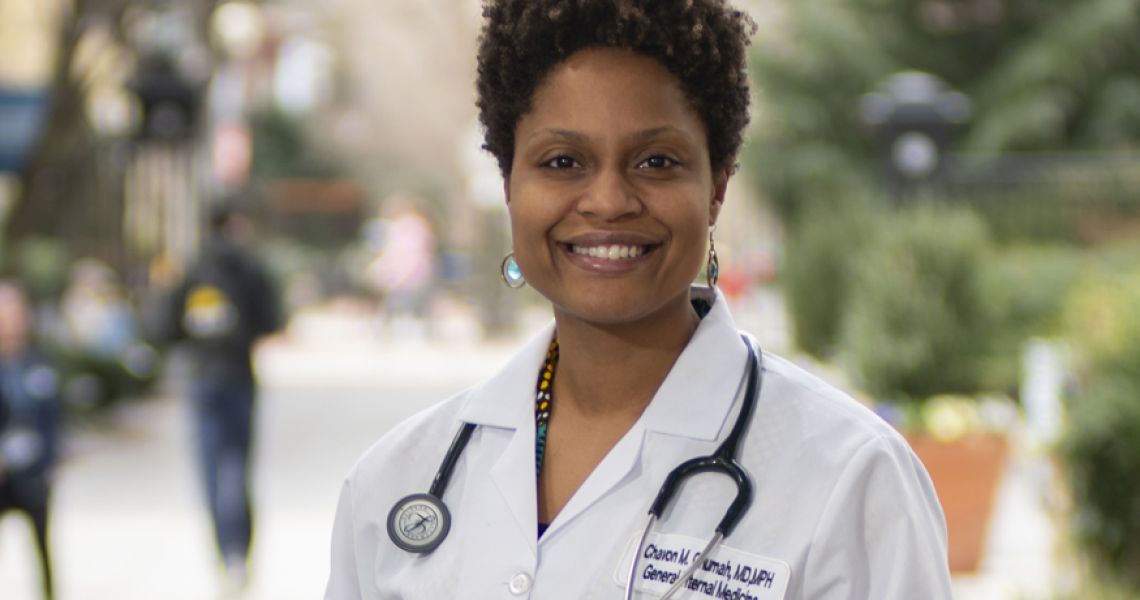Her hands flutter, a physical manifestation of her enthusiasm for diversity and inclusion, as Chavon Onumah, MD, MPH, CERT ’16, describes her analogy, borrowed from industry leader Verna Myers: “Diversity is inviting people to the party, and inclusion is asking people to dance.” The two concepts are interrelated, she clarifies; you don’t want people at the party who are wallflowers, reluctant to participate or contribute. Plus, she says, there’s an additional element to the analogy: belonging. “Belonging is dancing like no one’s watching,” Onumah says. “My goal is to get to a point where we all feel this sense of belonging, free to bring our authentic selves and contribute our unique talents.”
Onumah, an assistant professor of medicine at the George Washington University School of Medicine and Health Sciences, is a champion of diversity and inclusion, which she believes are critical to health equity.
“What motivates me is essentially what motivated me to go into medicine: health equity,” she says. “That’s what’s at my core, that’s what I’m interested in. From growing up in the Chicago area, to medical school in New Orleans, to training in Minnesota, to now being here in D.C., the inequities that I’ve seen across all those different stages in life are just atrocious to me.”
The research on the benefits of diversity — among them more innovation and higher productivity — is clear, she adds, and the “grand plans” are there, but putting initiatives into practice takes a different kind of strategy. First, she says, it’s important to acknowledge that diversity extends beyond race and ethnicity or gender.
“There’s also diversity in experiences,” she explains. “Upbringing, whether or not you come from a lower socioeconomic or higher socioeconomic group, ability or disability, what area of the country or the world [you come from]. There are so many different elements beyond ethnic and gender diversity, so thinking about diversity globally in that way is necessary too.”
Second, whether on a macro or micro level, being intentional — a word peppered throughout her explanations — is key. Take Washington, D.C., for example; the logical conclusion is that such a diverse city would attract a diverse workforce, but that’s not always the case. “I think we can be a little naive in thinking that because this is a place that’s rich in ‘diversity,’ we don’t have to be intentional or deliberate about our efforts,” Onumah says.
"From growing up in the Chicago area, to medical school in New Orleans, to training in Minnesota, to now being here in D.C., the inequities that I’ve seen across all those different stages in life are just atrocious to me.”
Likewise, when looking at a less diverse area of the country, say a rural Midwestern town, a similar concept applies. “If you’re in a smaller location or a rural area, assuming that no one wants to come here because the area is not ‘diverse,’ that can harm you too,” Onumah says. “I think that highlighting and being intentional about diversity initiatives wherever you are, regardless of what degree they might already be present, lets people know [diversity] is something that is important to us and something that makes us better and richer; it improves the experience for everyone.”
Narrowing the focus to medical specialties, Onumah says that same kind of care and thoughtfulness is just as crucial. “There are certainly people of diverse backgrounds ... who are interested in all fields of medicine,” she explains. “But what happens sometimes, it’s not so much that people aren’t interested [in a specialty] or talented, it’s our selection process.”
Urology, for example, is a largely male-dominated field, so there may be some unintentional barriers to promoting diversity and inclusion, Onumah says. “When we are recruiting or interviewing people, are we having more fluid conversations with those who are like us? Are we more likely to rate highly, mentor, or sponsor those who are like us?” she asks, adding that people naturally gravitate toward those like themselves. “[If so,] then we will continue to recruit, train, and support a more homogenous group. [We need to] be intentional about trying to catch ourselves when we’re acting on this ‘similar-to-me bias,’ and [we need to] purposefully make efforts to ensure those in the non-majority are given an opportunity and feel that they are welcome here.”
Going into 2020, graduate medical education (GME) has made some intentional progress, Onumah adds, but there’s still work to be done. For instance, she’s hoping to expand the “sphere of support and belonging” in the internal medicine training program to other specialties in GME through education, outreach, events, and mentorship. In addition, through Building the Next Generation of Academic Physicians, or BNGAP, she’s working to get women and underrepresented students and trainees more involved in academic medicine. Strengthening the pipeline to medicine for diverse trainees, she adds, is essential to achieving health equity.
Most importantly, she intends to make diversity, equity, and inclusion part of her legacy. “I think one of my major goals is to get people to really understand why diversity and inclusion work is crucial work and [to understand] that it is everyone’s work,” she says. “We all benefit from it.”




